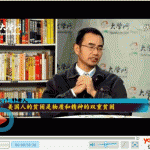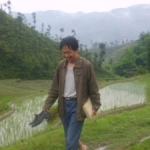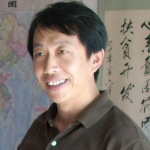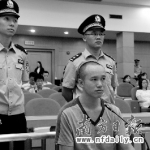Articles tagged with: translations
jj blog »

Utopia has up an very interesting, lengthy and wide-ranging interview with Han Deqiang on the ‘Occupy Wall Street’ protests. It tries to put the protests in a larger context of ‘globalization’, which Han explains as mainly the result of the strategy of companies in developed countries to boost their profits by moving production to developing countries, such as China. Along the way there’s an interesting discussion of poverty in the US, and a simple primer about ‘Who Rules America?”
Unfortunately, despite Han’s own explanation, and the interviewer’s faithful adherence to Han’s logic, in the end Chinese workers are told to enter into a united front with Chinese capital. Sigh.
jj blog »

From the middle of September, a great “Wall Street Revolution” has broken out in the United States. This street revolution, going by the name of “Occupy Wall Street,” has already expanded to over 70 cities and countries in North America, Europe, and other areas. In their statement on “The Wall Street Revolution,” the American people have sworn that this demand for “a democratic country, not a corporate kingdom” mass democratic revolution must spread to every part of the world, and they will not rest until this goal is met. From the anti-capitalist demonstrations that began after the 2008 financial crisis, and which this year have spread across Europe, the Middle East, North Africa and South America, this magnificent global mass democratic movement has finally spread to the center of capitalism’s financial empire-Wall Street.
Chinese Left, Contemporary China, CSG Translations, Husunzi, Rural China »

There are several reason for this sense of helplessness among the peasantry, including the market economy’s disruption of the peasant economy, the irresponsibility of local governments, and peasants’ lack of social capital, but the fundamental reason is the disorganization of rural society. Rural society today lacks cohesion, “like a sheet of loose sand.” Disorganized peasant households, depending on individual strength alone, cannot overcome natural hardships, nor can they face the challenges of the market or encroachments on their interests, and their self-confidence inevitably declines. The source of peasants’ spiritual poverty, therefore, is their lack of their own organization(s), and their loss of collective solicitude. At the same time, urban culture promoting individual competitiveness and interpersonal alienation has flooded into the countryside, further affecting rural culture and worsening peasants’ spiritual poverty.
Chinese Left, Contemporary China, CSG Translations, Husunzi, Rural China »

Comrade Liu Xiangbo (刘相波), better known as Liu Laoshi (刘老石), was the program coordinator of the Center for Rural Reconstruction at Renmin University of China, Ph.D. student at Renmin University’s School of Agricultural Economics and Rural Development, and founding director of the Liang Shuming Center for Rural Reconstruction. He passed away at 9:45 PM on March 24, at the age of 43, in the hospital of the Tianjin Armed Police Medical School, due to injuries from a traffic accident.
Chinese Left, Husunzi, Workers »

Repost from Meanwhile at the Bar of a translation by Jim Weldon of an article by “Red China” (红色中华), originally posted on Utopia. “LHH” refers to Liu Hanhuang, the 26-year-old migrant worker from rural Guizhou who killed two of his former Taiwanese bosses in June, in a row over compensation for the loss of Liu’s right hand while working in a hardware factory in Dongguan, after nearly a year of negotiation and Liu’s attempted suicide. He has become an internet hero among workers and the left in China.
